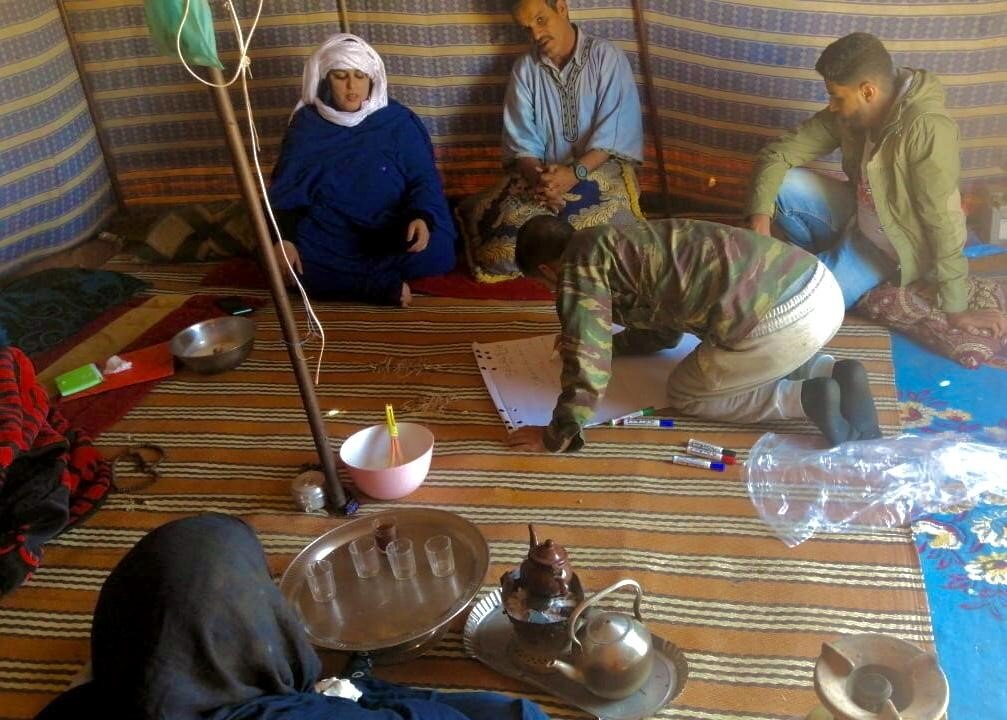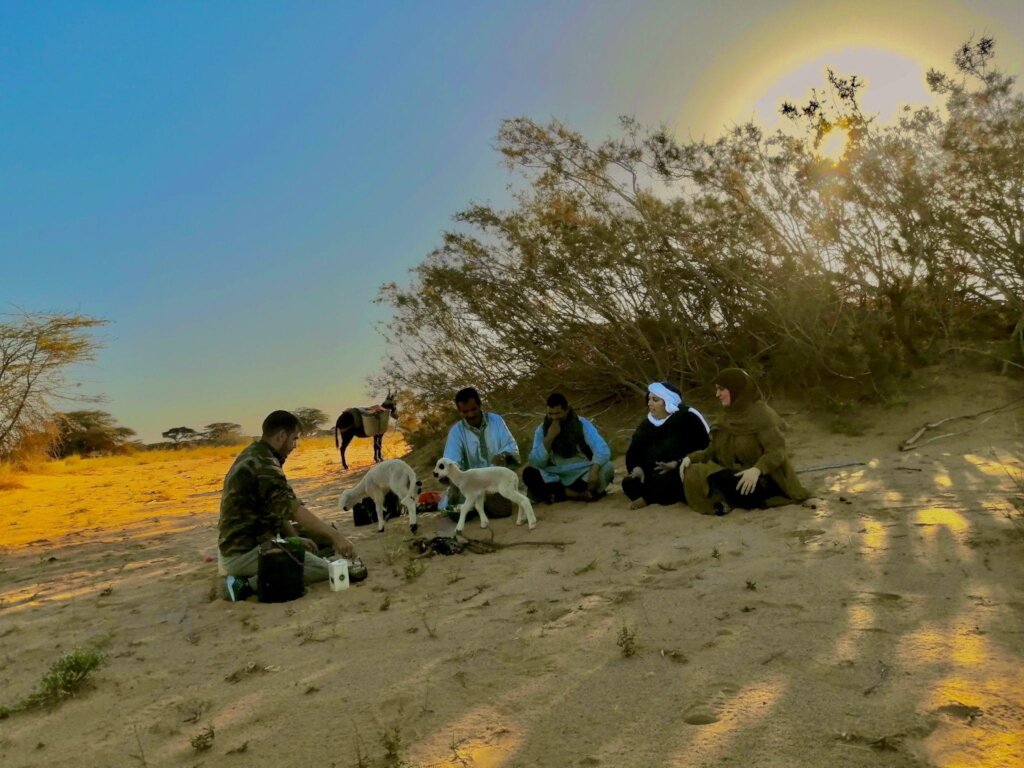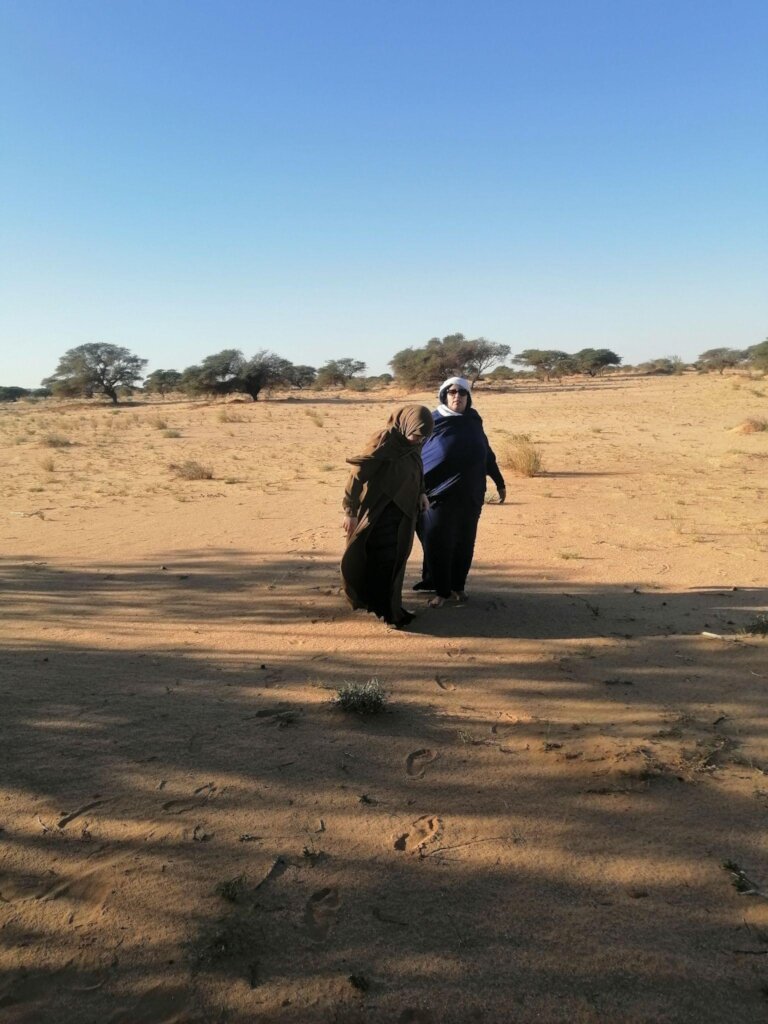By Cheikh Akmach | HAF Site Coordinator, Dakhla-Oued-Ed-Dahab region
On January 2nd, 2023, the High Atlas Foundation (HAF) Dakhla team embarked on a 143-kilometer-long journey to visit the Bir Anzarane municipality. This is one of the three communes selected for the implementation of the Participatory Planning and Implementation of Community Initiatives in Oued Ed-Dahab Region, in collaboration with the U.S.-Middle East Partnership Initiative (MEPI).
This new program engages with 150 participants from civil society and government officials in the area to benefit from a series of training and workshops that will improve their ability to design social, economic, and environmental projects that respond to local community priorities.
Hajiba, a member of the HAF team who has settled in Dakhla, is no stranger to rural life and has been involved in many HAF tree planting and women’s empowerment initiatives in the north and middle of the country. Her collaboration with people living in the barren desert has been a new experience for her.
There are no paved roads, no water or electricity systems, and no internet connection. One could stretch their eyesight to the limit and still not see a single person. The vast desert plains were only occasionally broken up by the sight of camel herds walking by.
To find the tent of their hosts, the team required the assistance of an experienced local Sahrawi driver who was well-acquainted with the region. The team was welcomed warmly by their hosts, who gave them camel milk and tea, the highest welcoming protocol in nomadic culture. Four nomadic families were waiting for them in the tent, each family bringing their own representative. After exchanging pleasantries, the workshop began.
The representatives all agreed that the principal challenge facing their communities was the difficulty of accessing water. They shared their difficulties, mentioning that three wells that had been supporting the livelihoods of the nomads in the region had stopped pumping enough water in the last five years. Some had even been damaged by wind and other natural factors.
The first one, Tourife Well, pumps sweet water and has a depth of 32 meters. It is located between the Dakhla Oued Eddahab Region and Laayoune Sakia El Hamra Region, and 45 percent of the nomads in both regions drink from it. However, the amount of water it pumps has been reduced due to various factors. The nomads hoped that the HAF team and partners could help them by deepening the well, building water wheels to make the camel herds' drinking process easier, and installing solar pumps to make the water pumping a carbon-neutral operation.
The second well is located in Bir Anzarane Commune and pumps salty water with a depth of 38 meters. It is unsuitable for people's needs but 95 percent of camels drink from it. The nomads hope that the well can be deepened, restored, and its solar pumps repaired.
The third well, also located in Bir Anzarane Commune, has a depth of 64 meters. Thirty-three percent of the nomads in the area drink from it. They hope to restore the well, deepen it, and install solar pumps.
On their way, the team visited two more nomadic families who shared the same concerns. For the nomads, water creates a transcendent existence. Without it, their camel and sheep herds will not survive, and they would lose their only source of income and food.
The Bir Anzarane Commune's nomads are facing huge pressure. When the HAF team spoke to them about the nature of their participatory governance project, the nomads gave a statement: "If we find an organization that is willing to help the nomadic families in repairing a well, then we are committed enough to start the project and protect it, and we hope this project will be implemented before summer. The Tourife well is the essential one, but if the organization would find working on another well more convenient, it is good for us as well.”
In conclusion, this visit to the Bir Anzarane Commune provided a first-hand account of the living conditions and difficulties faced by these communities. We were deeply moved by the warm welcome we received and the resilience of the nomadic families, despite their challenges.
By collaborating with these communities and addressing their most urgent needs, we can ensure a brighter future for the nomadic families of the Bir Anzarane Commune. Together, we can help protect these vulnerable communities and improve their access to basic necessities such as water.
Please contact the High Atlas Foundation if you would like to partner and make this clean drinking water initiative a reality with Bir Anzarane and other nomadic communities.
By Jennifer Anne Sopoci | F2F US Volunteer, HAF
By Fatima Zahra Laaribi | HAF's Lead Women's Empowerment Trainer
Project reports on GlobalGiving are posted directly to globalgiving.org by Project Leaders as they are completed, generally every 3-4 months. To protect the integrity of these documents, GlobalGiving does not alter them; therefore you may find some language or formatting issues.
If you donate to this project or have donated to this project, you can recieve an email when this project posts a report. You can also subscribe for reports without donating.
Support this important cause by creating a personalized fundraising page.
Start a Fundraiser

